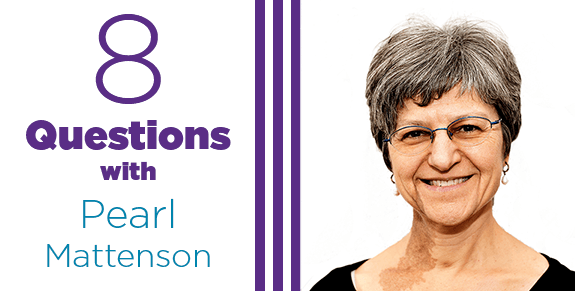
8 Questions with Pearl Mattenson
In “8 Questions With…,” we share a brief Q&A with a staff member. In this edition, we hear Pearl Mattenson, a certified systems coach and Director at Rosov Consulting. Pearl joined the team in 2014.
1. What’s your area(s) of expertise and how has it been beneficial and led to success in your work?
I am a systems coach. That means I specialize in enabling people to be in “right relationship” with each other — most commonly in organizational settings. With very few exceptions, we are all part of human systems; and because we are human, those systems don’t always run smoothly. Communications break down, roles get confused, conflict goes underground or erupts, etc. To the extent that I have helped leaders, leadership teams, and whole organizations function better, it is because I have deep trust in what we are all are capable of. I don’t treat problems — I champion people to show up as their best selves.
2. What experiences have led you into your current career path?
There were probably a few important turning points for me. The first is the experience of growing up in Japan during my elementary school years, where I had to learn how to integrate into a new culture and language. This experience really sensitized me to the nuances of communication and relationship. The second turning point was my work at the Anti-Defamation League, where for eight years I was deeply immersed in anti-bias culture change in institutions and saw what was possible when people with deeply ingrained biases were able to connect as human beings. The third was my many years working in and with Jewish Day Schools, where I saw over and over that an educator’s ability to sustain open, honest, and productive relationships with all stakeholders was far more critical to the enterprise’s success than almost any other factor.
3. What do you like learning about most through your work?
Well, people of course. I am endlessly fascinated by people—the life experiences that make us who we are and the fortitude that enables us to change at any age.
4. What do you like most about working at Rosov Consulting?
Take a guess—the people, and the culture. After 35 years of work, I have seen my share of dysfunctional organizational cultures, and I am grateful every day for the work we all put in to keep our organization healthy and productive.
5. What are some challenges of your work?
Probably the biggest challenge is keeping myself honest. Doing my own inner work so that I am walking my talk.
6. What have been the biggest changes in the field and/or your work specifically since you started?
Coaching as a field really only began in the mid 1980’s when I was just starting my career as an educator; certification of coaches didn’t begin until 1995. Today, in both the corporate and nonprofit world, it is far more the norm for leaders to work with a coach, which often is a benefit offered by the employer. Systems coaching is a little less common. What is slower to change is the stigma sometimes associated with bringing a coach into an organization.
7. How do you think your job and/or the field might change in the next 10 years?
I don’t know how it will change, but I know what I hope for. I want us to normalize the fact that organizations are always going to have people challenges, because human systems are complex. I want boards and leadership teams to be committed to paying attention to the oft–ignored human dimension of what it takes to succeed. And I want everyone in an organization to understand that wherever they sit in the hierarchy, they have an impact on their system. Having a positive impact is a choice we all make.
8. What do you think is essential reading to excel in your field?
I think all organizational leaders should read the complement of books by Patrick Lencioni. Each is a gem. But if you don’t have time for that, his last book which synthesizes his work, The Advantage, is probably best.




